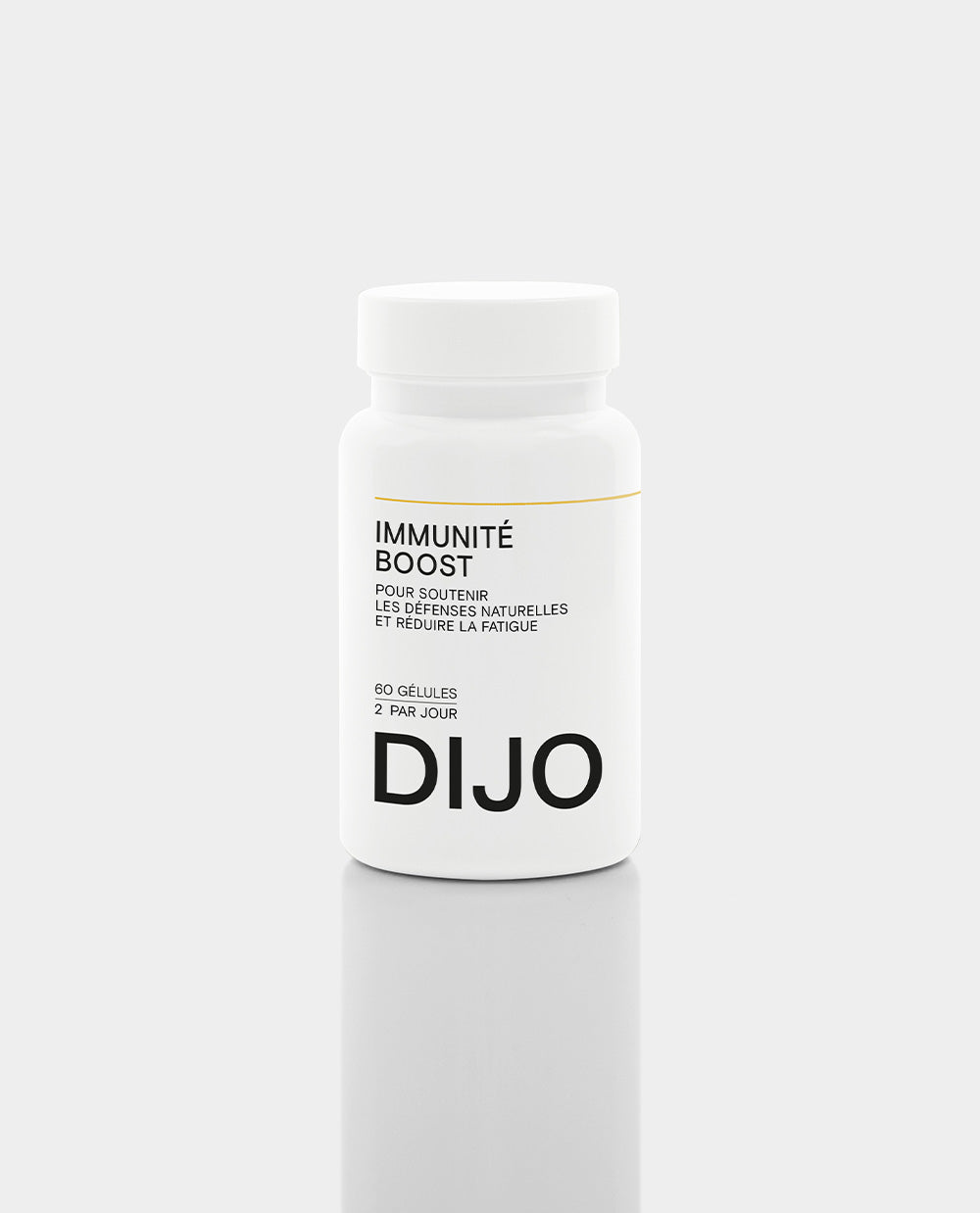The immune system is a collection of organs, tissues, and molecules that ensure the body's defenses. It plays a central role in the functioning of our body because it allows us to fight against external attacks and abnormalities that may arise.
What to remember
- The immune system is the body's first defense mechanism against pathogens
- It is closely linked to the intestinal microbiota which supports the production of immune cells
- To strengthen a weak immune system, it is important to find the cause
- Severe fatigue, recurring digestive problems, difficulty fighting infections or healing are signs of a weak immune system.
- A balanced lifestyle, pampered digestive flora and respected hygiene rules are essential to support the immune system.
- Taking food supplements may be recommended to strengthen it
Download our infographic “ Boosting your immune system ”.
Causes of a Weak Immune System
The immune system has many benefits for our health. However, when its action is impaired, the consequences for the body can be numerous. Here are some examples of causes of a weak immune system:
#1 - Intense fatigue
Lack of or impaired sleep leads to fatigue . This slows down metabolism and body function. The immune system is weakened and therefore less efficient.
In addition, the presence of a deficit or deficiency can be the cause of this continuous fatigue.
#2 - Mental or psychological state: stress and anxiety
An altered mental state (stress, anxiety, depression) leads to excessive hormone production, which fatigues the immune system. Chronic stress leads to a decrease in the production of immune molecules called inflammatory cytokines. These molecules have anti-pathogenic effects to prevent attacks on the body.
#3 - Consumption: food, alcohol, tobacco
Current food consumption has a strong impact on our health because most of the products we consume are industrial or even ultra-processed. Some of them therefore contain numerous additives that have a direct effect on the microbiota and alter the intestinal wall . This leads to an increase in intestinal permeability and toxic compounds can then cross this wall and create inflammation, thus causing intensive work of the immune system which, in the long term, weakens.
Similarly, excessive and regular consumption of alcohol and tobacco creates inflammation in the body which causes a loss of immune cells.
#4 - Seasonalities
Our resistance to disease varies depending on the season. We know that heat is one of the parameters for fighting pathogens. This is why it is more common to observe epidemics during the colder seasons (autumn and winter ).
#5 - The pathological condition
The presence of inflammation in the body can alter the functioning of the immune system and can be due to our lifestyles but also to a pathology. Some diseases are called autoimmune , which means that immune cells attack the organs or tissues of their own body. These diseases include type 1 diabetes, multiple sclerosis, Crohn's disease and Graves' disease.
#6 - The physiological condition
Finally, the physiological condition can also cause a weak immune system. During the first months of pregnancy , to avoid rejection by the mother's body, the fetus produces molecules that will weaken the mother's immune system.
Similarly, with age, the immune system becomes less and less effective. Older people are therefore more prone to infections and diseases.
Signs of a Weak Immune System
#1 - Intense fatigue
Fatigue can be both a cause and a consequence of a weak immune system. Overworked immune systems can weaken the body and overload it. This can ultimately lead to chronic fatigue .
#2 - Recurring digestive problems
When the gut microbiota is altered, the immune system is highly activated and weakens over time. This weakening creates a more intense imbalance in the microbiota. It's a real vicious cycle.
The alteration of the microbiota leads to numerous digestive disorders: gas, bloating, alternating constipation and diarrhea.
#3 - Repeated infections or illnesses
Getting sick occasionally during the winter isn't necessarily a sign of a weak immune system. Conversely, if it escalates, with repeated colds, tonsillitis, bronchitis, and the flu, it can be a warning sign.
#4 - Difficulty healing
Wounds that heal poorly or slowly or recurring bruises can also be warning signs of a weak immune system.
This can be due to many causes, so it is important to see a doctor if it happens regularly.
5 strategies to strengthen your immune system
To strengthen your immune system , several strategies can be implemented.
#1 - Adopt a healthy lifestyle
A healthy lifestyle is built on several aspects:
- Sufficient and restorative sleep : between 7 and 9 hours in a calm and dark environment
- A balanced and varied diet with good quality products, seasonal and local fruits and vegetables and few ultra-processed products
- Optimal hydration : 1.5L to 2L of water per day to ensure the body's basic functions
- Moderate alcohol consumption : maximum 1 glass per day and not every day
- Regular physical activity : walking, housework, cycling, running, weight training, yoga, Pilates, etc.
- Stress regulation : sophrology, meditation, yoga, cardiac coherence
#2 - Take care of your digestive flora
In order to strengthen a weak immune system, it is essential to take care of your digestive system by strengthening the intestinal microbiota . Here are some tips for taking care of it:
- Consume foods rich in probiotics : (lacto)fermented foods or products: yogurt, cheese, kefir, kombucha, sauerkraut, fermented vegetables, tofu, kimchi, sourdough bread, beer (in moderation), etc.
- Consume enough fiber (30g per day): legumes (lentils, beans, peas), whole grains (rice, quinoa, wheat, rye, oats), undercooked, underprocessed or dried fruits and vegetables, oilseeds (almonds, walnuts, hazelnuts, cashews, peanuts), potatoes, seeds (chia, poppy, flax).
- Stay well hydrated to aid digestion.
At DIJO, we have a basic range dedicated to stomach well-being. Our essential probiotics, combined with the action of glutamine , will help balance digestive flora while strengthening the intestinal wall. These products are grouped together in our "Cement Intestine" pack and should be taken as a course of treatment for long-lasting effects. The high concentration of probiotics and carefully selected strains will provide rapid, beneficial effects tailored to any digestive, immune, and metabolic problem.
#3 - Start a course of food supplements to strengthen the immune system
Dietary supplements, as their name suggests, complement and enhance the actions of a balanced lifestyle. Due to the micronutrient depletion of our food, it is sometimes recommended to add specific dietary supplements to your routine that combine micronutrients that have a direct effect on the immune system:
- Vitamins A, C, D stimulate the body's natural defenses and help reduce fatigue.
- Iron contributes to the optimal functioning of the immune system.
- Zinc contributes to the proper development and functioning of the immune system .
- Selenium helps protect cells against oxidative stress .
#4 - Prevention through vaccination
In prevention, there are also more medical prevention options. Preventive vaccination is a very good way to facilitate the action of the immune system. The principle of preventive vaccination is simple: injecting an attenuated or inactive substance that will allow the immune system to defend itself against a pathogen (bacteria or virus) and then produce memory immune cells. These memory cells allow the body to defend itself more easily and quickly if an infection from the same pathogen occurs.
#5 - Respect hygiene rules
In order to best prevent and reduce the risk of infection, basic hygiene rules must be respected:
- Wash your hands regularly with soap and water or hydroalcoholic gel
- Sneeze into a tissue or your elbow
- Avoid frequent contact with sick people
Sources :
[1] Yang B. et al. (2019). Effects of regulating intestinal microbiota on anxiety symptoms: A systematic review. General psychiatry, 32(2), e100056. https://doi.org/10.1136/gpsych-2019-100056
[2] Wimalawansa SJ (2023). Infections and Autoimmunity-The Immune System and Vitamin D: A Systematic Review. Nutrients, 15(17), 3842. https://doi.org/10.3390/nu15173842
[3] Sleep ⋅ Inserm, Science for health, (2017), consulted on https://www.inserm.fr/dossier/sommeil/
[4] Munteanu, C., & Schwartz, B. (2022). The relationship between nutrition and the immune system. Frontiers in nutrition, 9, 1082500. https://doi.org/10.3389/fnut.2022.1082500
[5] Vaccines and vaccinations, an individual and collective benefit, (2022), consulted on https://www.inserm.fr/dossier/vaccins-et-vaccinations/





















